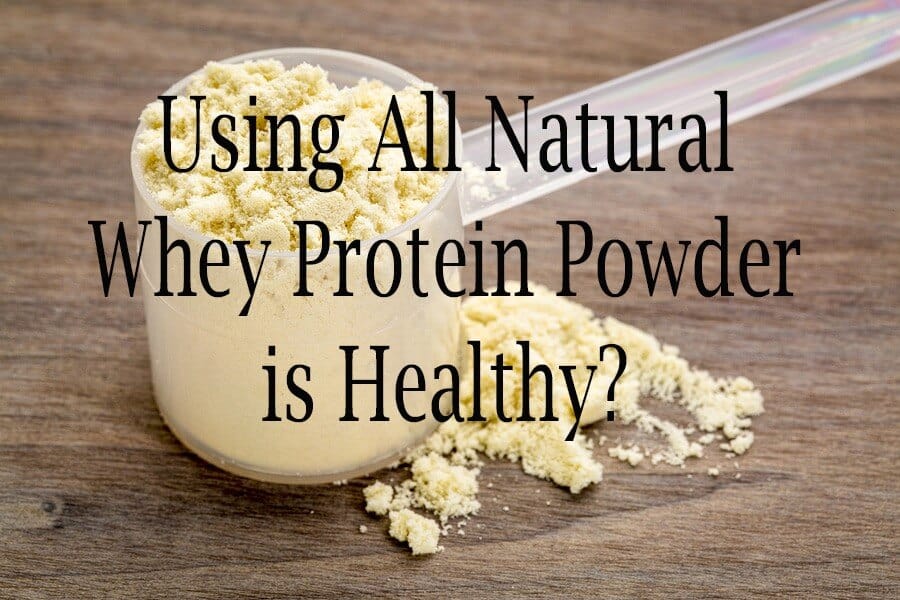 Whey protein powder is a highly popular supplement. It can consumed for the purpose of increasing amino acid intake. Thus providing the nutrients required for muscle-building. However, we have to ask the question: is whey protein powder really healthy?
What does that mean, “healthy”? What’s the definition of that word in this context?
We like to define of “healthy” as: improving your body function, free of or low in side effects, and providing benefits to your health.
Below, we’ll look at whey protein powder—both all natural protein powder and the commercial supplements—to see just how “healthy” it really is.
Whey protein powder is a highly popular supplement. It can consumed for the purpose of increasing amino acid intake. Thus providing the nutrients required for muscle-building. However, we have to ask the question: is whey protein powder really healthy?
What does that mean, “healthy”? What’s the definition of that word in this context?
We like to define of “healthy” as: improving your body function, free of or low in side effects, and providing benefits to your health.
Below, we’ll look at whey protein powder—both all natural protein powder and the commercial supplements—to see just how “healthy” it really is.
Why Whey Protein?
Before we get into the health factor of whey protein, you need to understand what the protein powder really does.
To sum it up in a few words:
- Whey protein provides the amino acids required for the expansion of existing muscle tissue and the production of new muscle tissue. These new and larger muscle fibers are able to store more energy. Meaning more energy is available during muscular contraction. The result: stronger muscles with greater stamina and endurance.
Whey Protein: It’s All About the Source
One of the most common misconceptions about whey protein is that it’s all the same. The truth is that the nutrient profile of the whey protein depends largely on the source of the whey used for the protein. If the whey comes from industrial livestock, it’s usually going to have a different nutrient profile from whey that comes from grass-fed beef. This is due to the fact that the cows are fed different food, so they end up absorbing a different range of nutrients.- Studies show that Grass-Fed Cows have 2-3 times more CLA, along with 3 times more Omega-3 fatty acids, than grain fed cow. This can have a visible effect on your Omega-3 levels. It ensuring there are more of these vital fatty acids available to you when you consume the grass-fed, all natural whey protein.
- Industrial Livestock will produce milk that has a higher saturated fat content than grass-fed cow’s milk. Worse, the saturated fats will be heavy on the myristic and palmitic acids. Which are more prone to raising cholesterol levels. Grass-fed cow’s milk is richer in stearic acid, which won’t have such a significant effect on cholesterol.
Finding High Quality Whey Protein
If you are considering taking whey protein as a supplement to improve nutrient intake or promote muscle-building, you’re in luck! Whey protein is an excellent addition to your diet and workout program. However, it’s important that you find high quality whey protein!How can you do that?
- Avoid artificial ingredients – Artificial sugars and sweeteners can make your protein powder tastier. But it will also raise the health risks of your supplement. Try to find whey proteins that contain as little sugar as possible, and definitely steer clear of anything sweetened by aspartame and other artificial sugars. Avoid anything with artificial flavoring, coloring, or preservatives.
- Look for minimal processing – Commercially-produced supplements by the big name brands (like Optimum Nutrition or BSN, for example) go through a lot of processing in order to extend their lifespan. However, this processing can affect the nutrient profile of the protein powder. It increasing its unhealthy saturated fat content and eliminating vital Omega-3 fatty acids. You should look for whey proteins that have been minimally processed in order to find the protein that’s in its most “natural” state.
- Fewer ingredients = better – There are protein powders that contain a single ingredient: whey protein. These powders are made without sugar, flavor, or sweetener of any sort. They may not be the tastiest powders on the market, but they tend to be the most natural and the least chemically altered. It’s okay to have a few added ingredients (such as vanilla or chocolate for flavoring), but fewer ingredients is ALWAYS better.
- Go for grass-fed – Remember that grass-fed, all natural whey protein has a much better nutrient profile than the processed whey protein that comes from industrial livestock. You can’t find truly “organic” whey protein, but you can find whey protein that is made from grass-fed cows—the closest. It gets to true organic for whey protein powder.
Latest posts by pete (see all)
- The Best Protein Shakes for Diabetics - November 30, 2022
- Whey Protein vs Pea Protein: Which is Better? - September 27, 2022
- Gluten Free Protein Powder - August 19, 2019





